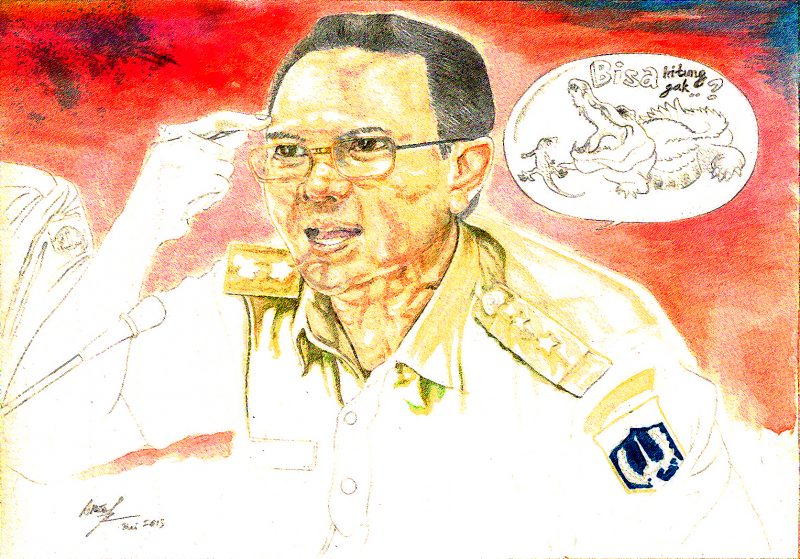Critics call him impulsive and crass, while supporters think he’s a no-nonsense political saviour. Here’s everything you need to know about governor ‘Ahok’.
It’s not a particularly common thing for a Chinese-Christian man – a double minority in Indonesia – to become famous in the world of local politics instead of business. Basuki Tjahaja ‘Ahok’ Purnama, the former regent of East Belitung, has come a long way as governor of Jakarta, bringing rapid change and unabashed political controversy to the capital.
In 2012, Joko ‘Jokowi’ Widodo paired up with Ahok as his deputy and won the gubernatorial election for the period lasting until 2017. Ahok stood as vice governor, until Jokowi took on Prabowo Subianto in the 2014 presidential race, soon becoming the leader of Indonesia. Ahok then became governor of Jakarta by default, and has since been shaking things up in the Big Durian.
When Jokowi took the helm as president, many believed all the progress he made in Jakarta would stagnate, as it was likely too soon for someone to replace him. This was particularly true for Ahok, a Chinese-Christian in the country with the world’s largest Muslim population. Many thought he was unfit for office. However, Ahok slowly gained momentum and a camp of support with his non-traditional stance on politics and governing. Ahok is both loved and hated by Indonesia’s political insiders. He is outspoken, to the point, and ruthlessly pragmatic, yet he is also one of the most popular officials in the archipelago.
Ahok frequently uses harsh language when speaking to reporters and his constituents alike. To be fair, the people he yells at often have it coming, but even when they don’t, the governor remains indifferent all the same. A good word might be ‘filterless’, as Ahok tends to speak his mind on everything from legal issues to controversial politics and even his own personal matters.
Ahok thinks the Indonesian government is slow and inefficient. During his first two months as governor, he fired half of the city’s civil servants and used the administration’s money to boost salaries of employees that were performing well. So why is this guy popular? The answer is that he appears tough on corruption. One of Ahok’s daily routines is meeting up with citizens who have trouble dealing with unethical administration procedures. Unlike any politician before him, Ahok gave out his personal phone numbers as “hotlines” for ordinary citizens to send him complaints. After working hours on weekdays or on the weekend, Ahok claims to make time to read the messages himself.
One of his breakthrough initiatives is the concept of transforming Jakarta into a “Smart City” via technology and social media. The project would allow Jakartans to check transportation schedules online, find great places to have a meal, and even adopt a city orphan, among other digital overhauls. Critics say the Smart City initiative is unrealistic, but governor Ahok doesn’t seem affected by public opinion. One crucial element to the project is empowering locals to report illegal or unethical occurrences in Jakarta back to the governor’s office through the use of an app called Qlue. Essentially, Qlue turns anyone with a smartphone into a bona fide whistle-blower in the nation’s capital.
Ahok’s policies are as controversial as they are potentially disruptive. Turning the status quo on its head, Ahok chose to contain prostitution into certain areas of the city, instead of trying to completely eradicate the illegal trade, which the government has been fruitlessly attempting to do for years. Illegal red light districts inevitably relocate to other areas after each expensive shut down by law enforcement officials.
As quoted by Tempo in a statement to reporters outside City Hall in February, Ahok said, “I have no problem with prostitution, no one can get rid of prostitution. You think prostitutes in Dolly, Surabaya are gone? Many of them are [still operating] in the cemetery.”
Ahok bucked popular opinion again when he returned the option about whether to wear hijabs in school back to the female students themselves, saying schools should not force Muslim girls to wear them. This decision was met with a great deal of public outrage and anger by officials and conservative citizens alike.
In a separate but infamously colourful incident, Lulung Lunggana, deputy of the Regional People’s Representative Assembly, said he would cut off his own ear if governor Ahok made good on his threat to sue the nation’s Supreme Audit Agency over a report that suggested Ahok’s provincial government may have colluded to mark up the purchase of land from Sumber Waras private hospital.
On the other hand, he is also not without support. Many Jakartans praise Ahok for his work as governor. The voluntary organization known as Teman Ahok (Friends of Ahok) seeks to have him re-elected as governor in 2017. The group obtained over one million copies of locals’ identification cards to showcase how many citizens want Ahok to run as an independent candidate. Following the campaign’s success, political parties like Golkar, Nasdem, and Hanura have also raised their hands in support of re-electing him.
“One million IDs is just the beginning. We have fulfilled our promise as citizens who wanted Pak Ahok to manage Jakarta once again,” says founder and spokesperson of Teman Ahok Amalia Ayuningtyas in an interview with Indonesia Expat. “Now, as many political parties start to move closer to the election, we are glad that Ahok only has to choose which way he wants to go.”
There are large disparities between the perceptions and beliefs of Ahok supporters and the opposition. To this, Ayuningtyas explains, “It’s the nature of democracy. There are pros and cons to every aspect, just like how Ahok’s policies have them too. People’s scepticism is a sign that they are observing. However, scepticism toward Ahok or the provincial government should take the form of responsible criticisms. This is especially true when done publicly or on social media.”
Even to the Teman Ahok organizers, the governor is not perfect. “Of course there are critiques from us regarding his policies. Internally, we use them as a discussion topics. In public, we always try to give information about pros and cons of his policies in creative ways such as videos and graphic designs, based on research and discussion with experts,” adds Ayuningtyas.
Regarding factors that might affect Ahok’s re-election, Ayuningtyas says how the candidate chooses to run is important. If he chooses to nominate himself through one of the political parties, many independent supporters will be disappointed, and the public will view the move as inconsistent with Ahok’s politics to date. But regardless of whether he runs for re-election independently or under a party’s flag, Teman Ahok claims it will continue its support. “We are not great at playing the ‘what if’ game. What is clear, however, is that Teman Ahok is prepared to make sure he can run Jakarta once again,” says Ayuningtyas.
To provide another interesting perspective on Jakarta’s love-hate relationship with its governor, Indonesia Expat interviewed Juneman Abraham, a social psychology professor from BINUS University, who in the past has been a member of the General Elections Commission selection team. Essentially, this means he has experience in choosing the folks who have final say in which candidates are allowed to run for governor in the capital.
“When it comes to Ahok, society could be split in terms of attitude. Constructive attitudes are shown through appreciation towards his performance that aligns with good governance,” says Abraham.
“People with destructive attitudes often view his ideas cynically and negatively, with occasional attacks – directly or subtly – by his political opponents.
From what I’ve observed, constructive supporters do not only come from his political allies (Teman Ahok, for example), but interestingly, also from the citizens whose daily activities are not connected to politics.”
From a psychological standpoint, Abraham claims people who are politically involved will always think constructively about the policies and candidates they like, while also trying to deconstruct those they fear. According to him, Ahok is winning in terms of his “psychological distance” with the public.
Abraham explains, “Jakarta citizens have very small distance from Ahok because he is easy to meet in-person in front of City Hall every day. Additionally, he’s always present as his work and activities are often recorded in the media and aired on YouTube. Due to these presences, we can often observe him speaking based on concrete data and logic. This has resulted in the popular view of Ahok being clean and honest. His presence is also facilitated virtually by hotlines and the Qlue application, giving Jakartans the sense of his availability at every second.”
Abraham’s assessment seems to hold up. Ahok tries to reduce his distance with people via various social identities. He built the first ever mosque in City Hall. He made City Hall open to the public, dismissing the restricted vibe given by most other government buildings in Indonesia. On several occasions, Ahok has identified himself as an independent by saddling up to his supporters rather than any one political party. He even asked for the blessing of his supporters when attempting to negotiate with various political parties. However, Abraham claims some see Ahok as arrogant and arbitrary due to the way he delivers messages.
On the quickly obtained one-million-citizen identification cards, Abraham says, “It is a result of what we call a self-regulated society, which emerges from the urgency to save Jakarta. When supporters feel a politician is in danger, self-reflective discourse is easily developed, resulting in spontaneous yet tactical action plans to protect their candidate.” Ahok himself has also taken the position of ‘nothing-to-lose’ while often being put down in public. This helps him pique the public’s curiosity, which can sometimes lead to support.
Critics say Ahok’s Achilles heel is his shoot-from-the-hip nature. “Ahok likes to hypothesize based on his own data, which sometimes is too early to be disclosed to the public,” says Abraham. “Some see him as impulsive and accusatory toward others.”
An interesting example of this comes back to Ahok threatening to sue the Supreme Audit Agency on charges of corruption. Although Lunggana (the man who made promises to Vincent Van Gotye) still opposes the governor, Ahok’s accusations were partially vindicated when one of the agency’s leaders, Muhammad Sanusi, was recently arrested by the Corruption Eradication Committee.




